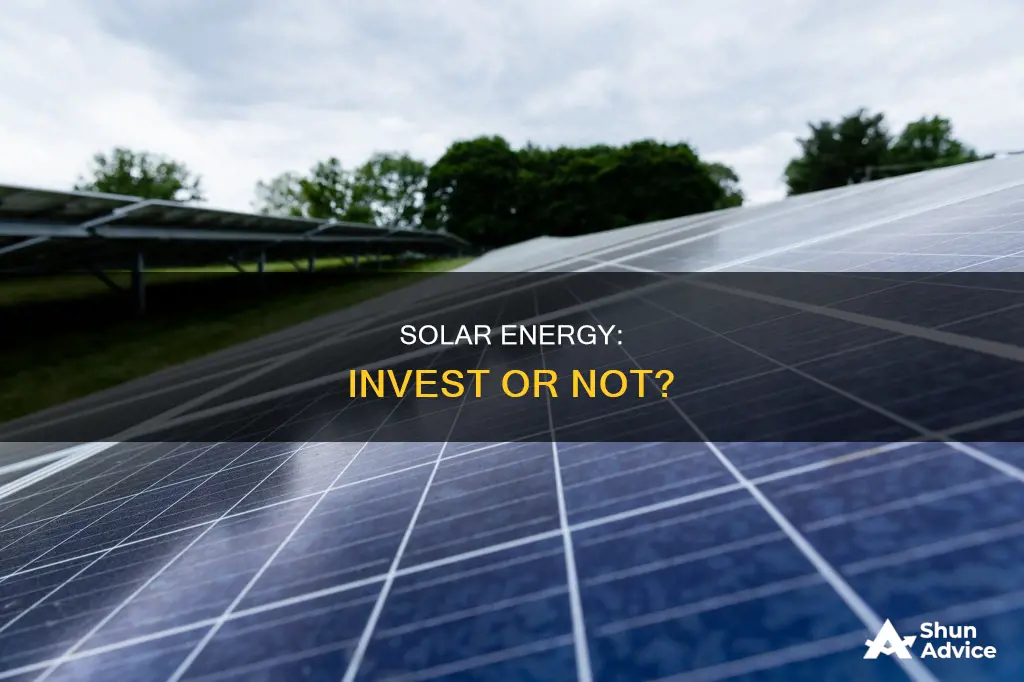
Solar energy is an increasingly popular alternative to fossil fuels. Investing in solar energy can be a good idea for several reasons. Firstly, it is a sustainable and renewable energy source, offering a future-proof alternative to finite fossil fuels. Secondly, solar energy can reduce electricity costs for homeowners, as well as increase property values. Additionally, solar energy is environmentally friendly, reducing carbon emissions and air pollution. Finally, solar energy can provide energy security during power outages and protect against rising energy costs. However, there are also challenges and drawbacks to investing in solar energy, including high upfront costs, weather dependence, and space requirements for solar panels.
What You'll Learn

Solar energy is a viable alternative to fossil fuels
Solar energy is widely considered one of the most exciting and viable alternatives to fossil fuels. As individuals, companies, and governments become increasingly concerned about global climate change caused by carbon emissions, solar energy offers a promising solution as a clean, renewable power source.
One of the biggest advantages of solar energy is its sustainability. Unlike fossil fuels, which are finite resources, the sun is an abundant and constant source of energy with billions of years of energy potential remaining. This makes solar energy a more reliable and long-term solution for meeting our energy needs.
Solar energy also has a relatively low environmental impact compared to fossil fuels. Solar-powered electricity offers much lower greenhouse gas emissions and does not cause the same level of damage to the land as fracking or drilling for oil, natural gas, and coal. By transitioning to solar energy, we can reduce our reliance on fossil fuels, improve air quality, and protect the environment.
In addition to its environmental benefits, solar energy also offers economic advantages. Installing solar panels can significantly reduce electricity costs for homeowners, especially in sunny regions. Over the long term, solar energy can result in substantial financial savings, with some estimates suggesting savings of up to $110,000 over the lifetime of a solar panel system.
Solar energy also increases energy security and independence. By generating electricity from solar panels installed on rooftops or ground mounts, individuals can reduce their dependence on the traditional energy grid and shield themselves from rising energy costs. This also contributes to a more stable and resilient energy infrastructure.
While solar energy has its challenges, such as intermittency and the need for storage solutions, advancements in technology and research are constantly being made to overcome these obstacles. As solar energy continues to gain traction, it is becoming an increasingly viable and attractive alternative to fossil fuels, offering a brighter and more sustainable future for our energy needs.
Small Investments, Big Returns
You may want to see also

Solar panels can increase property value
Solar panels can be a strategic consideration for property investors. They can increase a property's value in several ways. Firstly, the cost of the panels and their installation is reflected in the property's value, similar to other extensions or features added to a house. The higher initial outlay is likely to be reflected in a higher sale price.
Secondly, solar panels represent a significant yearly saving on utility bills, which is an attractive benefit for potential buyers. The promise of lower living costs can command a higher property price. In addition, solar panels can even generate income by selling excess electricity back to the grid, further enhancing their value proposition.
Research by Solar Energy UK, a solar non-profit trade association, found that installing solar panels could increase a property's value by £1,891-£2,722. This increase is influenced by factors such as the current value of the house, its location, and size.
Furthermore, people are increasingly willing to pay a premium for eco-friendly and energy-efficient homes. As the world moves towards a greener and more sustainable future, properties with solar panels are becoming more desirable. This trend is expected to continue, with environmental legislation encouraging property owners to prioritise sustainability.
While there may be concerns about the upfront costs and maintenance of solar panels, it's important to note that prices have dropped significantly in recent years, and they are expected to become even more affordable. Additionally, solar panels are low-maintenance and have long lifespans, typically lasting over 25 years.
In summary, solar panels can increase property value by reflecting their installation costs, offering bill savings, generating potential income, and catering to the growing demand for eco-friendly homes. With the world's focus on sustainability and the decreasing costs of solar technology, investing in solar panels can be a strategic decision to enhance the value of real estate assets.
What Your Peers are Investing In
You may want to see also

Solar energy is a renewable resource
The renewable nature of solar energy offers a sustainable alternative to finite fossil fuels. As a renewable resource, solar energy will never run out, unlike fossil fuels, which will eventually be depleted. The sun is estimated to have billions of years of life left, making it a highly reliable source of energy.
Solar energy's renewability also contributes to its environmental benefits. As solar energy reduces our reliance on fossil fuels, it helps to minimise environmental pollution and lower carbon emissions, thereby slowing the effects of global warming. Solar energy is a clean energy source that does not produce air pollutants or greenhouse gases during electricity generation. While the production and disposal of solar panels do have some environmental impact, the overall environmental footprint is significantly lower than that of fossil fuels.
The abundance of sunlight in certain regions, such as the Southwest of the United States, further highlights the renewability of solar energy. This abundance of sunlight means that solar power can be harnessed on a large scale, providing a consistent and reliable source of renewable energy.
In summary, solar energy is a renewable resource that offers a sustainable and environmentally friendly alternative to non-renewable energy sources. Its renewability is a key factor in its growing popularity and potential to become one of the most viable alternatives to fossil fuels.
Retirement and Investment Trends
You may want to see also

Solar energy reduces utility bills
Solar energy is an increasingly popular way to reduce utility bills. The sun is a free, abundant source of energy, and using solar panels to harness its power can significantly lower electricity costs.
Solar panels can be installed on rooftops, walls, or the ground, and they work by capturing the sun's energy and converting it into electricity. This electricity can then be used to power homes and reduce utility bills. The exact savings will depend on factors such as electricity consumption, the size of the solar energy system, the amount of direct sunlight, and local electricity rates.
In the US, the national average price for electricity in June 2023 was $0.17 per kilowatt-hour (kWh). With the federal solar tax credit, the average price of electricity produced by solar systems is typically around $0.08 per kWh, less than half the national average. This price difference can lead to substantial savings over time. For example, over 20 years, a solar owner may save up to $47,896.39 compared to a grid electricity user, assuming 5% annual rate hikes.
Solar panels also increase the value of a home. Studies show that homeowners are willing to pay a premium for a solar-powered home, with one study indicating an average increase in home value by about $15,000.
In addition to the financial benefits, solar energy is a sustainable and renewable source of energy that reduces carbon emissions and other harmful pollutants. It also reduces water consumption and provides a more predictable energy cost, shielding homeowners from the rising cost of grid electricity.
Solar energy is a long-term, low-risk investment that can reduce utility bills, increase home value, and contribute to a cleaner environment.
Insurance: A Safe Investment Bet?
You may want to see also

Solar energy is environmentally friendly
Solar energy is a clean, renewable energy source that can replace fossil fuels. It is a renowned clean energy source, but some claim it is not eco-friendly. However, solar energy has the power to transform the energy industry.
The environmental impact of solar energy is net positive. For example, the average homeowner powering 100% of their home with solar energy is equivalent to removing the emissions created by driving 19,316 miles per year in a typical car. Additionally, solar energy can reduce respiratory and cardiovascular health issues as it does not release air pollutants. An analysis by the U.S. Department of Energy's National Renewable Energy Laboratory found that widespread solar adoption would significantly reduce nitrous oxides, sulfur dioxide, and particulate matter emissions, leading to fewer health problems such as chronic bronchitis and respiratory issues.
However, it is important to note that producing and using solar energy technologies may have some environmental impacts. For instance, hazardous chemicals are used in the manufacturing of photovoltaic (PV) cells and panels, which must be carefully handled to avoid releasing them into the environment. Additionally, the replacement rate of solar panels is faster than expected, and with high recycling costs, there is a risk that used panels will end up in landfills. Nevertheless, the overall benefits of solar energy far outweigh its costs, making it one of the most environmentally friendly energy sources available today.
Young Investors: Excited or Apprehensive?
You may want to see also
Frequently asked questions
Solar energy can significantly reduce electricity costs, offering long-term financial savings. It can also increase property value, with homes with solar installations selling for 4% more on average.
Solar energy is a clean, renewable resource that reduces reliance on fossil fuels, thereby minimising environmental pollution and contributing to a cleaner environment.
The biggest drawback of solar energy is that it is intermittent, as it is dependent on the sun and can be affected by cloud cover. Additionally, solar installations typically require a large upfront investment, and certain conditions such as roof shading or orientation can impact their performance.







